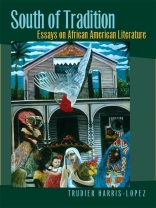With characteristic originality and insight, Trudier Harris-Lopez offers a new and challenging approach to the work of African American writers in these twelve previously unpublished essays. Collectively, the essays show the vibrancy of African American literary creation across several decades of the twentieth century. But Harris-Lopez’s readings of the various texts deliberately diverge from traditional ways of viewing traditional topics.
South of Tradition focuses not only on well-known writers such as Zora Neale Hurston, Ralph Ellison, James Baldwin, and Richard Wright, but also on up-and-coming writers such as Randall Kenan and less-known writers such as Brent Wade and Henry Dumas. Harris-Lopez addresses themes of sexual and racial identity, reconceptualizations of and transcendence of Christianity, analyses of African American folk and cultural traditions, and issues of racial justice. Many of her subjects argue that geography shapes identity, whether that geography is the European territory many blacks escaped to from the oppressive South, or the South itself, where generations of African Americans have had to come to grips with their relationship to the land and its history. For Harris-Lopez, ‘south of tradition’ refers both to geography and to readings of texts that are not in keeping with expected responses to the works. She explains her point of departure for the essays as ‘a slant, an angle, or a jolt below the line of what would be considered the norm for usual responses to African American literature.’
The scope of Harris-Lopez’s work is tremendous. From her coverage of noncanonical writers to her analysis of humor in the best-selling The Color Purple, she provides essential material that should inform all future readings of African American literature.
Sobre el autor
TRUDIER HARRIS is University Distinguished Research Professor in the Department of English at the University of Alabama. She is author of The Power of the Porch (Georgia), The Scary Mason-Dixon Line: African American Writers and the South, and Martin Luther King Jr., Heroism and African American Literature.












